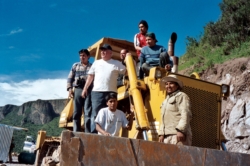‘Ut Cognoscant Te’ -- ‘That they might know You’
This is the first column of an occasional series that will chronicle the impact that Boston’s priests have made in Latin America through the St. James Society, an impact that drew its spirit from a promise on the motto emblazoned on Cardinal Cushing’s seal: “That they might know You.” In 2008 the Society will celebrate its 50th anniversary.
Skeptics said it wouldn’t work!
That’s what some people thought when Cardinal Richard Cushing announced the formation of the St. James Missionary Society back in 1958. In truth, you really couldn’t blame them. The very idea of diocesan priests leaving the comforts of Boston to serve voluntarily for five years as missionaries in the underserved areas of Bolivia, Ecuador and Peru, raised some honest doubts. Would diocesan priests really have it in them to serve as missionaries in the poorest areas of these countries? Would they crack under the strain of life in city slums, rural mountains, hot deserts, and steamy jungles?
The missionary effort to Latin America made sense in theory. Catholicism was deeply entrenched among the people, but priests were scarce and access to the sacraments was difficult. In a sense, it all happened rather naturally according to Father Joseph Martin of Somerville -- the idea that every diocesan priest was a missionary had been deeply instilled into every seminarian at St. John’s Seminary by Cardinal Cushing. “So it made little difference whether you were sent to North Andover or into the Northern Andes. You went wherever you were sent as a missionary. We didn’t see ourselves as any different from anybody else.”
“Of course,” Father Pearsall of Lowell recalled, “it was a time when Boston was ordaining 50 or 60 men each year and the cardinal could lend priests to the missions. Formal lend-lease programs were even instituted to aid bishops around the world in need of clergy. So the missionary spirit had already been instilled in all of Boston’s priests.”
When Father Pearsall, Father Martin and Father Tony Vasaturo of Medfield arrived in the high Andes mountain town of Andahuaylas, Peru they were greeted as something of a curiosity. Who were these Americans? Did the Catholic Church really care about them after all? Indeed, the Church would not leave them spiritually abandoned.
Until a suitable rectory was built, the three missionaries rented an apartment, lived among the people, and taught in the schools, building a sense of community. Since then, every established mission parish has been turned over to the local bishops as the society moves further out to remote areas where people need priests.
Frank Mazzaglia is a weekly columnist and layman associated with the St. James Society.



















